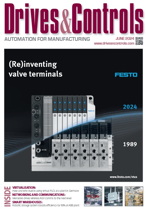- Home » News » Technology News
Power storage modules support DC buses in servo systems

Kollmorgen has developed a range of power storage modules incorporating a novel capacitor technology designed to improve the performance of servo motion systems by re-using braking energy and bridging short power outages safely.
There are three versions of the KCM modules: one provides active support for DC bus circuits; the second offers short-term energy storage and re-delivery of braking energy without mains distortion; while the third version combines the functions of the first two in a single module.
The active support module is designed to support the DC buses of single- and multi-axis systems – such as Kollmorgen’s AKD servo family. In acts like a UPS (uninterruptible power supply) for the drives. By maintaining the DC link voltage during short-term power failures, it reduces the risk of uncontrolled outages, machine damage and lost production.
The German Federal Network Agency has found that such problems are increasing, and resulted in around 200,000 interruptions to low- and medium-voltage applications in Germany during 2011 alone.
The active support modules produce a balancing effect directly in the DC-link without costly installation. They are switched on automatically and store energy in metered amounts during normal inverter operation to avoid overloading the inverter’s charging circuit. They are said to offer a cost-effective alternative to high-maintenance, high-inertia electromechanical energy storage systems.

The energy storage versions of the modules store braking energy dynamically. They are placed in the DC-link and do not disturb the mains supply, unlike complex regenerative systems. The capacitors store energy during braking and return it to the DC-link when power is needed for acceleration.
The short-term buffering of energy in the expandable modular storage system cuts peak currents during acceleration and reduces power consumption. Because the energy generated during braking is not dissipated in resistors, it avoids unwanted heating.





